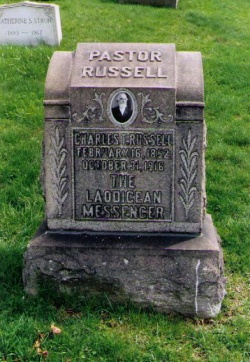William Branham and the Watchtower Society: Difference between revisions
| Line 24: | Line 24: | ||
Russell, like William Branham, believed that he was chosen for his "great work" from before his birth. | Russell, like William Branham, believed that he was chosen for his "great work" from before his birth. | ||
The November 1, 1917, Watch Tower, carried an article titled “A Tribute to the Seventh Messenger” in which it said: | |||
:''The two most prominent messengers, however, are the first and the last—St. Paul and Pastor Russell.… “That wise and faithful servant” … now many more are recognizing, that Pastor Russell is that servant.<ref>David A. Reed, Answering Jehovah’s Witnesses: Subject by Subject, electronic ed., (Grand Rapids: Baker Book House, 1997).</ref> | |||
{{Bottom of Page}} | {{Bottom of Page}} | ||
[[Category: Unfinished articles]] | [[Category: Unfinished articles]] | ||
Revision as of 16:06, 2 December 2016
William Branham borrowed a number of doctrines from the Jehovah's Witnesses (aka the Watchtower Society). These include:
- Michael the Archangel is Jesus Christ
- The revelation of the seven church ages (see below)
- The criticism of Christmas
William Branham refused to speak against the Watchtower Society
In 1954, William Branham was asked the question - Is Jehovah Witness a false sect? It is interesting that he would not answer the question:
- Now, here was another one just said… I'd… I—I appreciate this asking. And Almighty God Who is my Judge, standing here now in this sacred spot… Before I left home, the Spirit of the Lord told me, said this question will be laying on here. And I—I knowed nothing about it, but I knew it would be here.
- Is Jehovah Witness a false sect? See, somebody… And the Holy Spirit, at the place at the… Standing in my bathroom before coming down here, God, Who is my solemn Judge, told me, "That will be laying on the platform," and said I wouldn't say nothing about it, just go on. See? So I… You know what I said last night, don't you? All right, that's what it was. 20 All right, now we'll start over here on some of these. I just don't like to call right out any certain thing, and say some person or some individual like that. I just like to teach it in a way of just throw the whole thing together. And—and you understand, don't you? If I'd stand here and say, "Now, Brother Neville is so-and-so and certain-certain thing…" If I had that to say about him, I'd go up to his house and call him out and talk to him about it. See, I'd—I'd tell Brother Neville.[1]
Did he refuse to respond because he had studied many of their doctrines and was incorporating many of them into his teaching, including the belief in a "seventh" messenger?
The seven church ages
Charles Taze Russell authored a book entitled "The Finished Mystery: A Helping Hand for Bible Students" which was published posthumously by the Watchtower Society in 1918.
In it, Russell describes his "revelation of the seven church ages" with the first messenger being St. Paul and the last messenger (to the Laodicean church) being Charles Taze Russell as noted on his gravestone. Russell was the first one to assign names to the seven angels of Revelation 2 and 3.
Russell, like William Branham, believed that he was chosen for his "great work" from before his birth.
The November 1, 1917, Watch Tower, carried an article titled “A Tribute to the Seventh Messenger” in which it said:
- The two most prominent messengers, however, are the first and the last—St. Paul and Pastor Russell.… “That wise and faithful servant” … now many more are recognizing, that Pastor Russell is that servant.[2]
Footnotes
